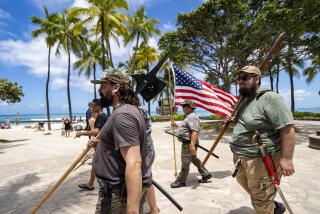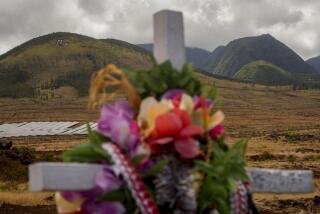In Hawaii, hanai helps to fill in for the stork : Some fear a modern culture clash may be endangering the ancient custom of sharing infants from large families with childless couples.
- Share via
WAIMANALO, Hawaii — Kawehi Kanui was walking slowly, pregnant with her fifth child, when a friend approached. “Kawehi,” she said, “I have a question that will test how Hawaiian you are: May I have your baby?”
Long before in-vitro fertilization and other high-tech methods of making babies, Hawaiians had their own way to balance the vagaries of nature. Those who were blessed with infants gave them to those who were not, a practice known as hanai.
Unlike Western-style adoption, which usually involves strangers and confidentiality, hanai takes place openly among family and close friends; a child is considered the greatest of gifts. Today, despite renewed celebration of native culture, some Hawaiians express concern that this ancient custom may be slipping away.
Kanui turned down her friend’s request. Her Hawaiian father-in-law told her that if she gave away the baby, “I’ll never speak to you folks again.” And in the end, she found that “it was a mother-child connection that I just couldn’t break.”
Her case illustrates the modern clash of views. Some Hawaiians no longer approve of the hanai, and even people like Kanui, a Hawaiian activist committed to her culture, find it hard to take this particular plunge. The mores and divisions of modern society militate against it. As extended families break down, opportunities for hanai shrink, too.
But a few people are bucking the odds. Kawaikapuokalani K. Hewett, a hula master, has hanai’ ed two children. His 11-year-old son and 9-year-old daughter were given to him when they were a few days old. Although hanai is permanent, children stay in touch with their birth parents.
“My son and my daughter know exactly who their parents are,” Hewett said, as the youngsters played outside. “It’s not a big black secret.” Traditionally, hanai children were honored and their position considered prestigious. Over the years, however, the more ambivalent attitude that Western society has toward adoption began to prevail. Observers trace the shift in attitudes as far back as the early 1800s, with the arrival of Christian missionaries.
“We were made to feel guilty for giving away our own children in hanai fashion,” Hewett says. “Even today, they have this stigma attached . . . People don’t realize that you’re never given away because nobody wanted you. You’re given in love.”
Historically, in addition to giving joy to childless couples, hanai cemented relations among families. The youngster kept a family tree alive and helped ensure transmission of cultural knowledge from generation to generation.
When their daughter was born, Kawahine Kamakea-Ohelo and her husband, Kalani Ohelo, were struggling in poverty. They respected Hewett’s expertise and fluency in Hawaiian, and decided that he could best raise little Leioheloulaopele.
“People ask me, ‘How could you give up your baby? She’s so beautiful!’ ” Kamakea-Ohelo said. “I tell them, we never gave up our baby. We’re sharing our baby. And our family got bigger.”
Kamakea-Ohelo now serves as executive director of the Waimanalo Health Center, in a largely native community nestled at the base of towering green cliffs. She and her husband, who have children of their own, say they wish the pregnant teen-agers who come through the clinic would consider hanai.
“There are different ways of being proud of being Hawaiian,” Ohelo said. “We practice it. After all, what kind of future would you want to see? A future that has a culture that is intact, that is being practiced, or would you want to visit a culture at the Polynesian Cultural Center or Bishop Museum?”
Like many clan-based societies, Hawaiians have always considered child rearing the responsibility of the entire extended family. This inclusive attitude is still evident today, at least superficially, among the general public. Children in the islands refer to trusted adults of their parents’ generation as “auntie” and “uncle,” regardless of blood ties.
(Hanai) is not an ownership thing,” says Hooipo DeCambra, a board member of the Waianae Coast Comprehensive Health Center. “It’s helping in child rearing.”
For those involved with hanai today, the challenge comes from outside. Family, friends and even strangers question the practice. Jarena Pacarro, 32, whose biological parents gave her at birth to her aunt and uncle, remembers the taunts of classmates.
“Telling people you were hanai-- they didn’t understand the concept,” Pacarro said. “(They’d say) ‘You’re adopted? What’s wrong? Didn’t your parents want you?’ ” she said. “I think I believed them, being so young.”
Pacarro, who has gone on to raise her own family, gave birth to her third child this year and can’t imagine giving her up. “I’m too selfish,” she said. “Perhaps with extended households, where you could see the child daily, it wouldn’t be that much of a threat.”
Judith Jenya Jackman, executive director of Global Children’s Organization, which handles adoptions, suggests that hanai holds lessons for everyone involved with children.
“They can learn that children are not personal property,” she said. “It’s important for people, whether they have hanai, natural or adoptive children, to think of these children as temporary gifts in their life, not as possessions.”
More to Read
Sign up for Essential California
The most important California stories and recommendations in your inbox every morning.
You may occasionally receive promotional content from the Los Angeles Times.













